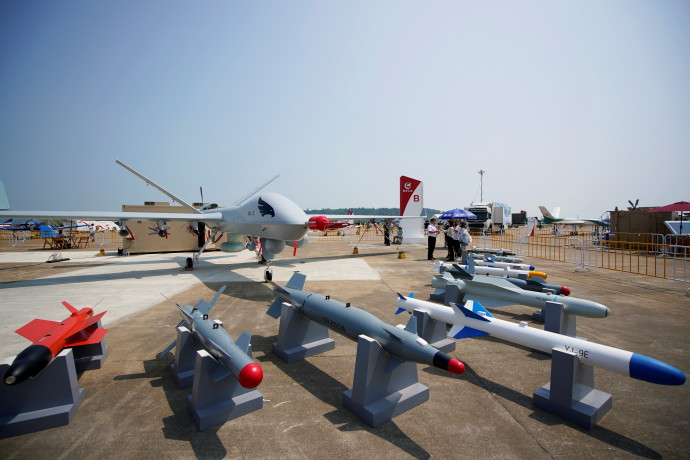China is showing off a new large drone at its important Zhuhai air show. This event is the 14th exhibition of its type in China and is usually where Beijing shows off new airplanes, drones and munitions. China has become a major player in the military drone market over the last decade.
While China makes a large number of drones, many of them borrow heavily from how American Reaper and Predator drones look. Those drones also have commonalities with Israeli large UAVs, such as Herons and Hermes.
As such China’s decision to unveil what is called the Wing Loong-3 is an attempt to showcase Beijing’s ability to build upon its existing smaller versions of the same drone, and claim that it now has a long-range drone capable of carrying numerous missiles.
Drones have been in the news lately because Russia is using Iranian kamikaze drones in the war on Ukraine. These are relatively cheap and simple delta-wing designs that are actually what is known as a “loitering munition,” meaning it’s a flying munition similar to a cruise missile.
The Iranian drones don’t even “loiter,” they just fly on a path into a target. They are deadly but they are also relatively simple as a concept. The Chinese Wing Loong is supposed to be a more complex version of the American Reaper.

According to reports in China, the new drone can fly up to 10,000km and has a 24-meter wingspan. It can carry up to 16 munitions, including missiles and bombs. It can carry air-to-air missiles which would make it more interesting than existing similar drones that are made in Israel or the US.
These kinds of drones are large UAVs, sometimes called “medium altitude, long endurance” or “MALE” as an acronym.
The US also makes the Global Hawk, a large drone that is used for surveillance. That drone has a takeoff weight of some 14,000kg and looks like a flying beluga whale. In comparison, the American Reaper has a takeoff weight of some 4,000kg and a wingspan of 21 meters.
The Reaper has a range of almost 2,000km and flies up to 50,000 feet and can carry some 1,400kg of munitions on its wings and 300kg of payloads internally. It can carry a variety of munitions but mostly is equipped with Hellfire missiles and JDAMs.
The Wing Loong drone models
By contrast, the new Chinese drone claims to be able to carry PL-10E air-to-air missiles so it can also strike helicopters and other drones. It can fly for some 40 hours and China claims it has a massive range of some 10,000km. It is made by the Chinese company AVIC.
AVIC already made other Wing Loong models that have been exported to 11 countries around the world. Now it has unveiled not only the large Wing Loong model, but also new versions of its existing drones; called Wing Loong 1E, Wing Loong 2y, and Wing Loong 2H, as well as the 10A and 10B.
The big question around all these drones is whether they will be exported and whether they will meet the needs of customers. In the past, China made rapid inroads in the Middle East with its drones because the US was reticent to sell the Reaper and Predator in armed versions.
China therefore could flood the market, but many countries appear to have been disappointed by some of the older models of China’s drones.
At the end of the day, the US has decades of experience with the Predator, and it takes a lot of experience to get drones to work in all-weather environments and have them do what countries want them to do. Israel also has four decades of experience with UAVs, having developed them in the late 1970s and early 1980s.
China, in contrast, can show off a lot of new platforms and make claims about the long ranges and weapons they can carry, but it’s unclear if they can accomplish these tasks until they have to be put into a war situation.
China’s drones have been used not only in the Middle East but also in North Africa. Some 17 countries used China’s armed drones, and countries like Pakistan have imported them for years.
The new Wing Loong 3 hints at the concept of using drones in combat against other drones or aircraft. This would be a major step in the use of UAVs.
Drones in future wars
Future wars are likely to be fought by countries that both have drones. Using drones as early warning systems in the air, or as pickets and trip wires for enemy forces, forcing them to go through an advance guard of expendable drones is a novel concept.
If a country can field dozens or hundreds of armed drones out in front of its forces armed with air-to-air missiles and other devices, then those countries may have an advantage.
China would have to show it can mass produce these drones and that they are able to conduct the kinds of long-range missions, staying aloft for a day or two, capabilities that the companies which make the drones claim can be accomplished.
The fact that Russia has sought out Iranian drones shows countries are hungry for the technology. The fact China isn’t exporting to Russia also shows the sensitivities involved.
Recent wars such as the one between Armenia and Azerbaijan show what drones can deliver on the battlefield. China’s new drones may hint at where air warfare is going.
